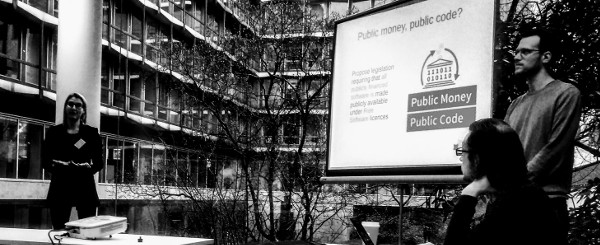European Free Software Policy Meeting 2018: more joint activities important for Free Software in Europe
Following the well-established tradition of gathering active Free Software groups before FOSDEM kicks off, the FSFE once again partnered up with OpenForum Europe for the third edition of European Free Software Policy Meeting in Brussels, the heart of European decision-making.

This time the purpose of the meeting was to shed light on topics important for Free Software in public policy all over Europe, not only within the European Union; and to exchange experience for any policy action within different regions in case similar concerns for Free Software pop up. Practice shows that they often do, and this is why it is important to be informed about similar actions in other parts of Europe, in order to be able to address corresponding concerns in a timely and effective manner.
17 different groups were represented at the European Free Software Policy Meeting 2018: from national Free Software groups to public sector representatives, and international organisations. Our participants deemed to be a diverse group, yet similar in the challenges we face on both national and European level.
Common challenges for Free Software in Europe and beyond
EU Copyright reform: Article 13 of the current copyright directive proposal can seriously hamper collaborative software development, and especially Free Software, imposing the use of mandatory upload filters, and illegal monitoring of their users. As a result of this proposal code repositories can be arbitrarily removed online. The directive proposal is currently being discussed by co-legislators in the European Parliament and the Council of the European Union, which both are struggling to reach an agreement on controversial Article 13. Action within the Member States to "#savecodeshare" is needed more than ever, in order to make sure that decision-makers understand the repercussions of Article 13 for Free Software.
Software patents: while the EU legislation to impose patents on software was rejected back in 2005, patentability of software insinuates itself into policy discussions through other means. In particular, the Unitary Patent Court Agreement (UPCA) may in practice impose the patentability of software in the EU. By now 15 Member States have ratified the UPCA, without such Member States as post-Brexit UK and Germany whose support is necessary in order for the Unitary Patent Court system to start to function. A petition against UPCA ratification was run in the UK, however, there is a need for remaining Member States to be aware of the practical ramifications of UPCA for innovation and especially software business in Europe.
Open Standards: standardisation policies are still being infiltrated by closed standards disguised as "open", and tricky patent licensing practices that are only called "fair, reasonable and non-discriminatory" (FRAND) in the name of greater innovation. In fact, these practices only dilute the discourse. It is time the term "open standards" is used in accordance with the Free Software definition defined through 4 freedoms, and appropriate Free Software licences as approved by Free Software Foundation and Open Source Initiative. Otherwise, we will continue facing misconceptions about (un)equal treatment of Free Software in public procurement, where Free Software can be de facto excluded as a result of policies prescribing business models.
Public Money, Public Code: "All publicly funded newly-established software should be made publicly available under Free Software licence". This is the demand that the FSFE together with ca 116 other organisations and Free Software projects, as well as more than 16 000 individuals are asking from politicians. The campaign is aimed at gathering evidence about public expenditure on software and other IT services in public sector, to provide information that is easily understandable for decision-makers, and to equip Free Software activists all over the world with tools to ask their politicians during national elections to make sure that software paid with taxpayers money is made freely available to the public.
Ways to move forward
The meeting once again proved that there is a need to continuously exchange ideas, update each other on concerns and victories for Free Software, and experience we gather while pursuing our mutual goals to maintain the ecosystem for Free Software to flourish. More collaboration and staying informed is necessary in order to establish the "smart network" of Free Software activists all over Europe and beyond, where more joint activities can take place. We will continue to build on that resource to share information, and update each other on activities crucial for Free Software, and to establish meaningful collaborations to address common challenges for Free Software.